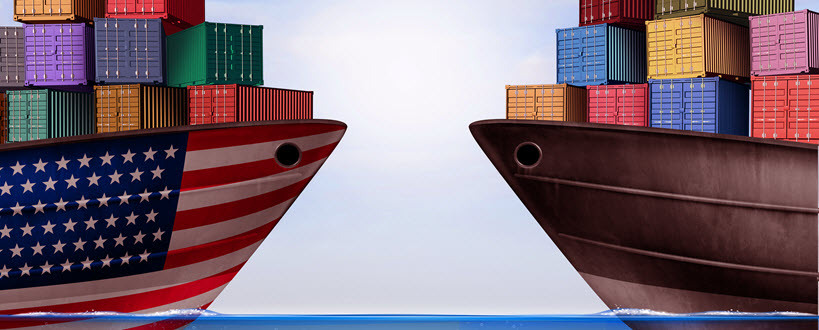What's Up With the Trade War Talk?
Written by The Content Team
Published on March 23, 2018
minute read
Share:
Global trade has been in the headlines recently thanks to new U.S. steel and aluminum tariffs and hefty tariffs now being proposed by the U.S. on goods from China.
The taxes on steel and aluminum — 25 per cent on steel imports and 10 per cent on aluminum — were unveiled by U.S. President Donald Trump in a bid to protect U.S. producers of the industrial metals. Because of the ongoing North American Free-Trade Agreement (NAFTA) negotiations, however, Canada and Mexico got an exemption from those tariffs.
Separately, President Trump on Thursday unveiled a plan to impose tariffs on around US$50 billion of Chinese imports.
The tariffs have resulted in rumblings of a potential trade war, which got us thinking about trade wars in general. Just what are they? And what's happened with trade wars in the past? We dug in to find out a little more.
Trade Wars Defined
What is a trade war? Simply put, it's "a situation in which countries try to damage each other's trade, typically by the imposition of tariffs or quota restrictions." That's the official definition according to the Oxford Dictionary. The war part comes into play because when one country implements a tariff, the country being affected will often consider some retaliatory measures on products coming across its borders.
Last Time Around
For steel at least, the U.S. last stepped into trade war territory in 2002 when then- President George W. Bush announced tariffs on imports of the industrial metal. Canada was exempt that time, too. Reports on the outcome of that case for the U.S. were mixed, ranging from job losses and higher consumer prices to increased production and higher wages. Those tariffs were cancelled after just one year, following threats of retaliation from Europe and a ruling by the World Trade Organization that called the tariffs illegal.
A Historical Example
The Smoot-Hawley Tariff Act of 1930 is behind one of the most well-known trade wars. Named after its chief sponsors — Reed Smoot, a Senator from Utah, and Representative Willis Hawley, from Oregon — the act has been blamed by some for worsening the Great Depression and contributing to the start of the Second World War. The bill imposed steep tariffs on hundreds of goods imported into the U.S., leading the country's trading partners to retaliate and causing world trade to plummet. The tariffs were repealed in 1934.
What's Next?
Trade is likely to remain a hot topic for the next few years as NAFTA negotiations continue to play out, but whether a full-blown trade war emerges remains to be seen.
RBC Global Asset Management's Chief Economist Eric Lascelles wrote recently that while the steel and aluminum tariffs themselves "have only limited direct consequences," they "have a real chance of turning into a full-on trade war — and the same goes for recent Chinese tariffs."
You can stay on top of what's happening through Market Commentary and News & Headlines, found under the Research tab.
RBC Direct Investing Inc., RBC Global Asset Management Inc. and Royal Bank of Canada are separate corporate entities which are affiliated. RBC Direct Investing Inc. is a wholly owned subsidiary of Royal Bank of Canada and is a Member of the Investment Industry Regulatory Organization of Canada and the Canadian Investor Protection Fund. Royal Bank of Canada and certain of its issuers are related to RBC Direct Investing Inc. RBC Direct Investing Inc. does not provide investment advice or recommendations regarding the purchase or sale of any securities. Investors are responsible for their own investment decisions. RBC Direct Investing is a business name used by RBC Direct Investing Inc. ® / ™ Trademark(s) of Royal Bank of Canada. RBC and Royal Bank are registered trademarks of Royal Bank of Canada. Used under licence. © Royal Bank of Canada 2018. All rights reserved.
The views and opinions expressed in this publication are for your general interest and do not necessarily reflect the views and opinions of RBC Direct Investing. Furthermore, the products, services and securities referred to in this publication are only available in Canada and other jurisdictions where they may be legally offered for sale. If you are not currently resident of Canada, you should not access the information available on the RBC Direct Investing website.
Explore More

7 Ways to Get Ahead Financially in 2026
How you might invigorate your finances and put your money to work more intentionally this year
minute read

Economic Outlook: Uncertainty is Here to Stay, So What's Next?
Takeaways from the Economic Club of Canada’s Annual Event
minute read

3 things: Week of December 15
What the Inspired Investor team is watching this week
minute read
Inspired Investor brings you personal stories, timely information and expert insights to empower your investment decisions. Visit About Us to find out more.







